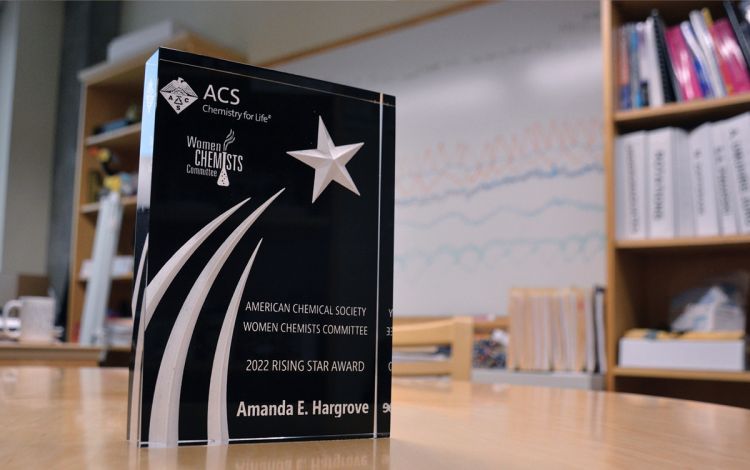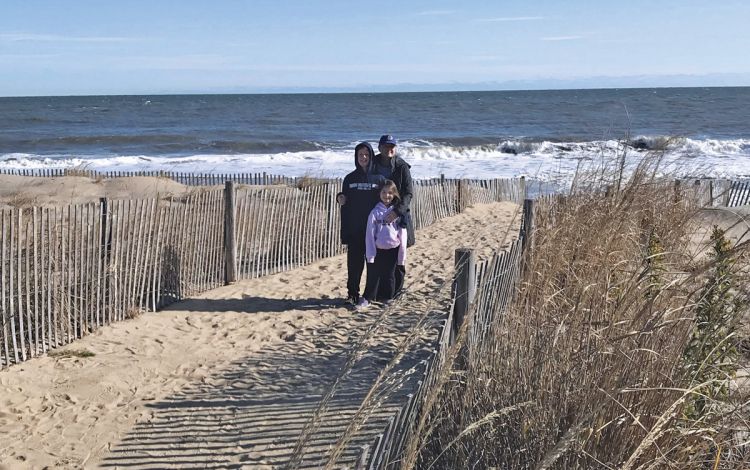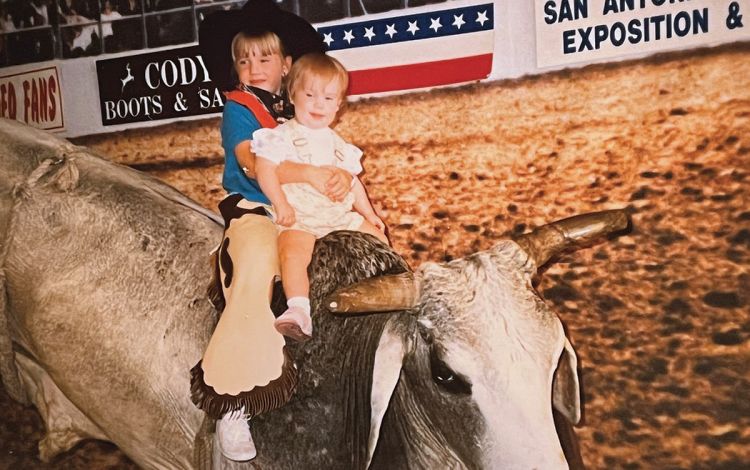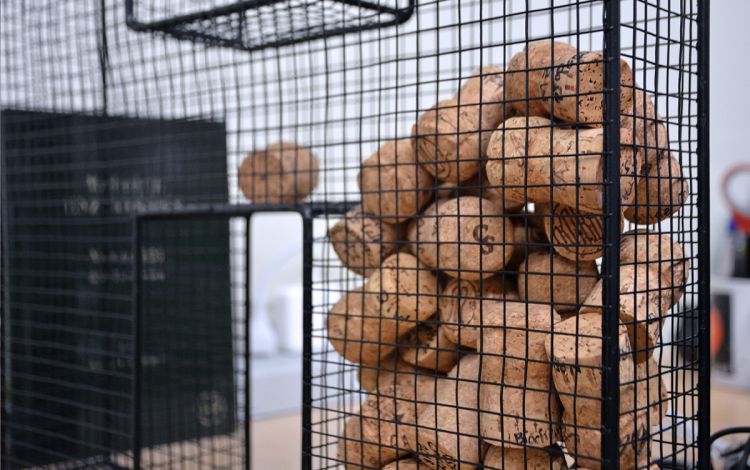June 8, 2022
Amanda Hargrove searches for ways to defeat cancer and viruses, while working to inspire future scientists

Name: Amanda Hargrove
Position: Associate Professor of Chemistry
Years at Duke: 8
What she does at Duke: In her role as a researcher, Amanda Hargrove, a 2020 Alfred P. Sloan Research Fellowand an American Chemical Society 2022 Rising Star Award winner, heads a lab that studies a specific type of RNA molecule and its potential role in breakthrough therapies.
In every cell, ribonucleic acid, or RNA, plays a critical role in carrying genetic information and directing the formation of proteins. But not all of the RNA molecules do this. The RNA molecules that aren’t involved in these processes – what scientists call “non-coding RNA” – were once thought to be fairly inconsequential. But in recent years, researchers have discovered that these molecules are involved in the process that allows cancer and viruses to spread.

Amanda Hargrove was honored with the 2022 Rising Star Award from the American Chemical Society. Hargrove’s lab is studying ways to disrupt the function of this type of RNA and, potentially, find therapies that can better fight cancer and protect against viruses, such as the agent behind Hand, Foot and Mouth Disease and COVID-19. “The idea is that, maybe the reason we don’t have as many cancer drugs as we’d like is that we’ve been going after the wrong class of molecules,” Hargrove said.
Aside from research, Hargrove is the chair of her department’s Diversity, Inclusion and Community Committee and serves as editor-in-chief of the journal Medicinal Research Reviews. She also teaches courses, including undergraduate and graduate level courses on organic chemistry and chemical biology as well as a seminar for first-year students meant to give them an early glimpse of authentic scientific research by letting them develop and test their own hypotheses.
“You can almost see their gears working,” Hargrove said of her students. “It’s so much fun to watch.”
What she loves about Duke: Hargrove appreciates that Duke’s brilliant minds aren’t bound by their academic disciplines. She said collaboration has been a constant part of her Duke experience as faculty are curious and supportive of one another’s work. She remembers feeling this in her earliest days at Duke when colleagues introduced her to a variety of other faculty members who they predicted she’d work with at some point.
Hargrove said this collaborative energy has resulted in projects which have seen her team up with colleagues from the Duke Cancer Institute, the Department of Biochemistry and elsewhere.
“I could tell from the beginning that, at Duke, community mattered,” Hargrove said.

When she’s not working, she likes to: Hargrove loves spending time with her 13-year old son and 8-year old daughter. From watching them practice taekwondo or indulging their recent obsession of baking shows, she finds great joy in spending time with her kids.
“One of the great things about having kids and a family is that it gives you an identity that’s not related to your job,” Hargrove said. “If something happens in your job, you’ve got this whole other role that’s more important. It makes dealing with the ups and downs of your job easier to manage.”
Best advice received: Hargrove recalls fellow scientist Laura Mahal telling her that networking is more than building contacts. It’s creating a trusted group invested in your success. Mahal said one effective way to build this group is by asking for help and acting on guidance.
“Once people give you advice, and they see you take it, they’re invested in your success because they contributed to it,” Hargrove said. “That’s a good way to build a network that sticks with you and supports you.”

Something most people don’t know about her: When Hargrove attended Trinity University in San Antonio, Texas, she did so with help from a rodeo scholarship. While the Houston-native grew up around rural environments, she never took part in any rodeo-related activities. Instead her scholarship was an academic honor awarded by the Houston Livestock Show and Rodeo, which, in addition to being a Texas agriculture tradition, is also a major supporter of the state’s top students.
“I like telling people about that, but it would have made for a cooler story if I’d gotten it for raising cattle or riding horses,” Hargrove said.
Most memorable day at work: In November of 2019, Hargrove was working at her desk in the French Family Science Center when she got a text from Blanton Tolbert, a chemistry professor at Case Western Reserve University. The two had been working on a project to see if a small molecule could bind to the RNA in the EV71 virus to inhibit transmission and eventually kill the virus. Tolbert had just gotten his hands on data that showed that the idea worked.
“He didn’t wait for an email, he just texted me a picture of the result and said ‘Did you see this?’” Hargrove said. “It was so exciting. I actually printed out that chart and carried it around in my backpack for a year.”

Something unique in her workspace: On Hargrove’s desk, there’s a large metal H-shaped basket that is slowly filling up with champagne corks. Each cork has a name and a date on it. The corks are from the bottles opened to celebrate each paper and successful Ph.D. defense for students Hargrove works with.
“Mentoring students and post-docs is one of my favorite parts of the job,” Hargrove said. “When something great happens for them, it’s just the very, very best.”
Lesson learned during the pandemic: Hargrove gained a new appreciation for how important it is for a university to put the needs of its people at the forefront. While the research and educational missions are essential, the pandemic underscored the value of making sure the students, faculty and staff at the heart of those missions are healthy and safe.
“It was really impressive to me how much people could come together, the Duke community in particular,” Hargrove said. “I did feel really grateful to be in this community. I don’t think there was a better place to be a faculty member during something like that.”
Full article: https://today.duke.edu/2022/06/blue-devil-week-friend-students-enemy-di…